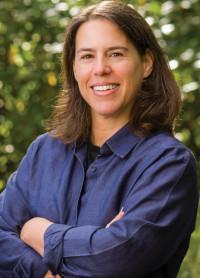Brodkin, Stumpf Named Top Teachers
Each year, students from the College of Arts and Sciences and Lewis & Clark Law School reflect on the extraordinary teaching of their respective professors and select one for top teaching honors.
Kimberly Brodkin: Undergraduate Teacher of the Year

Brodkin, who joined Lewis & Clark in 2002, specializes in gender and politics in the 20th-century United States. She holds a BA in history from the University of Pennsylvania and a PhD in U.S. and women’s history from Rutgers University.
“Beyond teaching in the Ethnic Studies and Gender Studies Programs—and being the faculty advisor for two out of the four academic symposia on campus each year—Kim is passionately driven to engage in dialogues about important topics and guide students with support and critical thought through difficult conversations,” writes one student nominator. “She is dedicated, intentional, compassionate, and will do anything to look out for her students. Every day, she pushes herself and her students to do more and be better, and she makes Lewis & Clark a more accountable and better place for everyone.”
Juliet Stumpf: Law School’s Leo Levenson Award

Stumpf had no plans to attend law school until an overseas trip to Ecuador changed her mind. While working with a human rights organization there, she learned how children had undergone torture by the secret police as a form of crime control. “Law seemed to me the only thing powerful enough to restrain that kind of unbridled exercise of government power,” she says.
After graduating from law school, Stumpf worked in a variety of settings, including a law firm, the Civil Rights Division of the U.S. Department of Justice, and the Ninth Circuit. Ultimately, she decided to become a law professor. “I turned to academia because it combined so many things that I love: teaching; writing; creativity; and collaboration with inspired, motivated students and advocates.”
More L&C Magazine Stories
Lewis & Clark Magazine is located in McAfee on the Undergraduate Campus.
MSC: 19
email magazine@lclark.edu
voice 503-768-7970
fax 503-768-7969
The L&C Magazine staff welcomes letters and emails from readers about topics covered in the magazine. Correspondence must include your name and location and may be edited.
Lewis & Clark Magazine
Lewis & Clark
615 S. Palatine Hill Road MSC 19
Portland OR 97219

